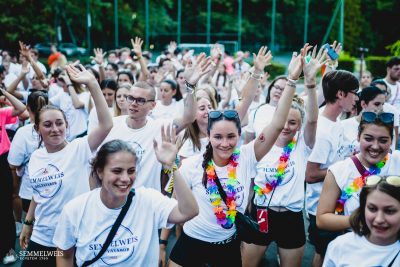Approximately eight hundred new international students began their studies at Semmelweis University this year. While foreign students can be found at each of the university’s six faculties, the majority are enrolled in the Faculty of Medicine. Foreign language programmes are becoming increasingly popular, which can be seen from the fact that while foreign students accounted for 18 percent of the total student population in the 2007/2008 academic year, this number jumped to nearly 25 percent by last year.
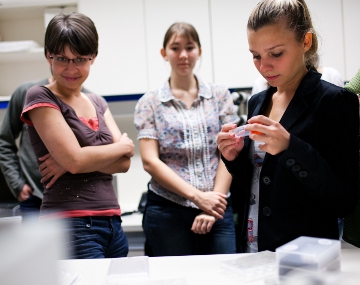 The German language programme is typically chosen by German and Austrian students, while the English language programme attracts students from nearly sixty nations across five continents. This year, the largest group of freshers came from Spain, though the majority of foreign students in general are from Germany, Norway, Iran and Israel. Many other nationalities, including Ugandans, New Zealanders and Saudi Arabians, can be found among the foreign students as well.
The German language programme is typically chosen by German and Austrian students, while the English language programme attracts students from nearly sixty nations across five continents. This year, the largest group of freshers came from Spain, though the majority of foreign students in general are from Germany, Norway, Iran and Israel. Many other nationalities, including Ugandans, New Zealanders and Saudi Arabians, can be found among the foreign students as well.
As a group, Semmelweis University’s international students are very certain about their future position, with 95 percent desiring to work in the same field they are currently studying. Students are, in general, very optimistic about their employment possibilities and aware of their status on the labour market, with 97 percent stating that it is either likely or certain that they will be able to find a job in their field of expertise within one or two years of graduation.
These are just a few highlights from the results of the Students’ Motivational Survey recently carried out by the Semmelweis University Graduate Tracking System. Approximately 15 percent of the foreign students answered the researchers’ questions. According to Edmond Girasek, assistant lecturer and head of the study, approximately half of the respondents want to work in the public sector, most of them in a clinic or national institution. The fact that nearly every third international student spent at least one semester abroad during their studies shows how mobile they are.
We had the pleasure of meeting four of the eight hundred new foreign students who began their studies at the University this year. Here, we introduce you to them.
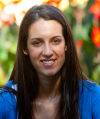 Patricia Ares Miro (19) is from Spain, studying at the Faculty of Medicine. She has known since her childhood that she wanted to become a doctor specialising in paediatrics, even though there is no such tradition in her family. “At home it is really hard to get into medical school, so I decided with my parents that it is worth to study abroad in English, because with an English language diploma I can work all around the world”. What Patricia misses the most in Hungary is the Spanish sunshine. After finishing university, she is planning to work as a volunteer doctor in Africa for one year.
Patricia Ares Miro (19) is from Spain, studying at the Faculty of Medicine. She has known since her childhood that she wanted to become a doctor specialising in paediatrics, even though there is no such tradition in her family. “At home it is really hard to get into medical school, so I decided with my parents that it is worth to study abroad in English, because with an English language diploma I can work all around the world”. What Patricia misses the most in Hungary is the Spanish sunshine. After finishing university, she is planning to work as a volunteer doctor in Africa for one year.
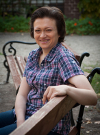 Maryam Ghambari (28) is from Iran. She learned about Semmelweis University and its Faculty of Dentistry from one of her friends: “He told that here I could get the best dentistry education in Europe”. Maryam’s brother also studies in Budapest, at Corvinus University. The two siblings live together, which is good, but also a bit unusual for Maryam: “In Iran everybody lives together with parents until marriage”. Maryam relates that she finds life to be very different here, and there are not so many rules. In spite of this, she misses Iran a lot: “Sometimes I go down to the Danube and just remember my hometown that also has a river”. What she most likes about Hungary is the weather and the fact that there is rain and snow.
Maryam Ghambari (28) is from Iran. She learned about Semmelweis University and its Faculty of Dentistry from one of her friends: “He told that here I could get the best dentistry education in Europe”. Maryam’s brother also studies in Budapest, at Corvinus University. The two siblings live together, which is good, but also a bit unusual for Maryam: “In Iran everybody lives together with parents until marriage”. Maryam relates that she finds life to be very different here, and there are not so many rules. In spite of this, she misses Iran a lot: “Sometimes I go down to the Danube and just remember my hometown that also has a river”. What she most likes about Hungary is the weather and the fact that there is rain and snow.
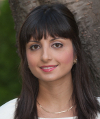 Gali Luzon (25) is from Israel. She is studying at the Faculty of Medicine, hoping to become a dermatologist. “In my country, it is very hard to get accepted to a medical university, so I chose to study abroad. I chose Semmelweis University partly because of its international programme, as I think, it is a challenge to study in English. And I have heard many good things about it at home from seniors who graduated from here,” she said. Gali finds Budapest very developed. One of the most interesting aspects of the city for her is that there are so many transportation options; in Israel, for example, there is no underground.
Gali Luzon (25) is from Israel. She is studying at the Faculty of Medicine, hoping to become a dermatologist. “In my country, it is very hard to get accepted to a medical university, so I chose to study abroad. I chose Semmelweis University partly because of its international programme, as I think, it is a challenge to study in English. And I have heard many good things about it at home from seniors who graduated from here,” she said. Gali finds Budapest very developed. One of the most interesting aspects of the city for her is that there are so many transportation options; in Israel, for example, there is no underground.
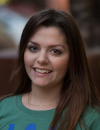 Evangelia Doulgeridou (19) is Greek and although raised in Germany chose to study in the Faculty of Dentistry’s English language programme. “Studying in English opens the doors towards many possibilities,” she explained. Evangelia decided to study in Budapest when she was about 7-years-old. “My siblings studied here, at Semmelweis. Once, when we visited them, we went to the Fisherman’s Bastion, and there I told to my father, I also want to study here”, she remembered. “The whole programme has fulfilled all my expectations so far, it is nice to meet so many people from all around the world who have the same aims, at least for the next few years,” Evangelia said.
Evangelia Doulgeridou (19) is Greek and although raised in Germany chose to study in the Faculty of Dentistry’s English language programme. “Studying in English opens the doors towards many possibilities,” she explained. Evangelia decided to study in Budapest when she was about 7-years-old. “My siblings studied here, at Semmelweis. Once, when we visited them, we went to the Fisherman’s Bastion, and there I told to my father, I also want to study here”, she remembered. “The whole programme has fulfilled all my expectations so far, it is nice to meet so many people from all around the world who have the same aims, at least for the next few years,” Evangelia said.
Pálma Dobozi and Gina Gönczi
The Development of Institutional and Student Services in Higher Education at Semmelweis University project was made possible through the support of the TÁMOP -4.1.1/A-10/2/KMR-2010-0006, with the professional collaboration of Educatio Nonprofit Ltd.


